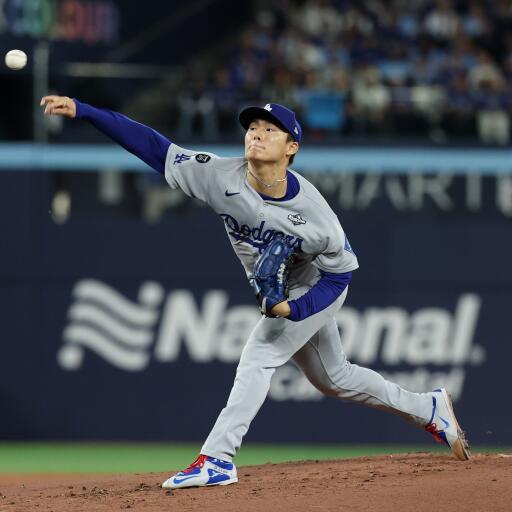
Photo Credit: Robert Gauthier / Los Angeles Times
***
After getting pounded in Game 1, 11-4, the Dodgers bounced back in Game 2, 5-1, to even the series at 1 against the Blue Jays at the Rogers Centre in Toronto.
The series moves to L.A. beginning Monday for games 2, 3, and 4.
The Dodgers starting pitcher, Yoshinobu Yamamoto, pitched a dominating four-hit complete game, allowing just one run with no walks and eight strikeouts. Tied at 1-1 in the seventh inning, catcher Will Smith finally broke through for the Dodgers and belted a solo home run, which traveled 404 feet to put the Men in Blue up, 2-1. Two batters later, Max Muncy belted a solo shot of his own to increase the Dodger lead to 3-1.
Los Angeles added two more runs in the eighth inning on a wild pitch from Jeff Hoffman and a groundout by Will Smith.
- The winner of the second game of the World Series has gone on to win the Fall Classic 78 times (65.0%).
- In three of the last five years, the World Series winner has lost Game 2 including Texas in 2023 (9-1 vs. AZ); Atlanta in 2021 (7-2 at HOU); and Los Angeles in 2020 (6-4 vs. TB).
- Prior to the Dodgers losing in 2020, the winner of Game 2 had won the World Series in five consecutive years dating back to the 2015 Royals.
- Overall, the winner of Game 2 of a Postseason series has gone on to win the series 271 times (70.6%). The World Series has now been tied at 1-1 64 times, with the winner of Game 3 going on to win the Fall Classic 42 times (66.7%).
- The Dodgers are 30-29 all-time in Game 3 of a Postseason Series, including 20-13 in Game 3 of a best-of-seven series overall, and 13-9 in Game 3 of the World Series.
- The Blue Jays are 8-5 all-time in Game 3 of a Postseason series, including 6-4 in Game 3 of a best-of-seven series overall, and 2-0 in Game 3 of the Fall Classic.
- The World Series has been won by the team with home field advantage 60 times (50.0%), including each of the last three seasons with the Dodgers in 2024, the Rangers in 2023 and the Astros in 2022.
- Game 2’s winning pitcher, Yoshinobu Yamamoto continued his postseason dominance, going the distance with no walks and seven strikeouts. He is now 3-1 with a 1.57 ERA this Postseason, allowing seven runs (five earned) on 17 hits with four walks, 26 strikeouts, a 0.73 WHIP and a .165 opponents’ batting average.
- Yamamoto is the first pitcher to throw a complete game in back-to-back Postseason starts since Curt Schilling tossed three consecutive complete games for the Diamondbacks in 2001, including Game 1 and Game 5 of the NLDS and Game 3 of the NLCS.
- The Japanese ace is the first player to throw multiple complete games in a single Postseason since Madison Bumgarner went the distance in the 2014 Wild Card Game and Game 5 of the 2014 World Series for San Francisco.
- Yamamoto retired 20 consecutive batters to end the game, beginning with Alejandro Kirk’s sacrifice fly in the third inning. It is the longest streak in Dodgers Postseason history, surpassing Carl Erskine, who retired 19 consecutive batters in Game 5 of the 1952 World Series.
- He became the fifth pitcher in World Series history to retire 20 consecutive batters to finish his outing, joining Don Larsen (27, 1956 G5); Grover Alexander (21 consecutive, 1926 G2); Dutch Leonard (20 consecutive, 1915 G3); and Jose Rijo (20 consecutive, 1990 G4).
- Will Smith launched a go-ahead homer in the seventh inning to give Los Angeles a 2-1 lead and Max Muncy followed two batters later with a solo blast of his own to make it 3-1.
- Smith’s homer marked the Dodgers’ eighth go-ahead homer in the seventh inning-or-later of a World Series game and the first since Freddie Freeman’s walk-off grand slam in Game 1 last year.
- It was the Dodgers’ first go-ahead blast in the seventh inning-or-later in a nine-inning game since Kirk Gibson’s walk-off blast in Game 1 of the 1988 World Series.
- The solo home run marked Smith’s first extra-base hit of the Postseason and he has now hit safely in each of his last six games this October.
- Muncy’s blast marked his 15th career homer in the Postseason, extending his Dodgers’ franchise record.
- It was his third career home run in the World Series after also homering in Game 3 of the 2018 World Series and Game 5 of the 2020 Fall Classic.
- George Springer went 1-for-1, ripping a leadoff double in the first inning. He now has 21 career doubles in the Postseason, tying former teammate Jose Altuve for sixth-most all-time.
- Freddie Freeman has reached base safely in each of the Dodgers’ 12 games this Postseason, marking the longest on-base streak of any player in the Majors this October.
- Freeman is additionally the fifth Dodger to reach base safely in at least 12 consecutive games within a single Postseason, matching Justin Turner (2020); and Steve Sax (1988).
- With a single in the second inning, Ernie Clement extended his hitting streak to eight games.
- His eight-game hitting streak is tied with Hall of Famer Paul Molitor for the fourth-longest in Blue Jays Postseason history within a single Postseason.
- Clement is now hitting .429 this Postseason, tied with Hall of Famer Gary Carter (1981) and Jose Offerman (1999) for eighth-best all-time among players with at least 40 plate appearances in a single Postseason.
- Vladimir Guerrero Jr.’s .431 average ranks just ahead of Clement, at seventh-best all-time.
- Toronto’s Game 2 starting pitcher Kevin Gausman retired 17 consecutive batters, with five strikeouts during the stretch.
- Will Smith ended the stretch with a go-ahead homer in the seventh inning.
- Gasuman’s 17 consecutive batters retired is the second-longest streak in Blue Jays Postseason history, trailing only David Price, who retired 18 consecutive batters against the Royals in Game 2 of the 2015 ALCS.
- Saturday marked the fifth time in World Series history that at least 21 consecutive batters were retired.
- Game 2 lasted just two hours and thirty-six minutes (2:36), marking the shortest World Series game since the Dodgers and Astros played Game 1 of the 2017 World Series in two hours and twenty-eight minutes (2:28).
–Compiled by Bill Lucey
Source: MLB Press Office
October 26, 2025

Leave a Reply